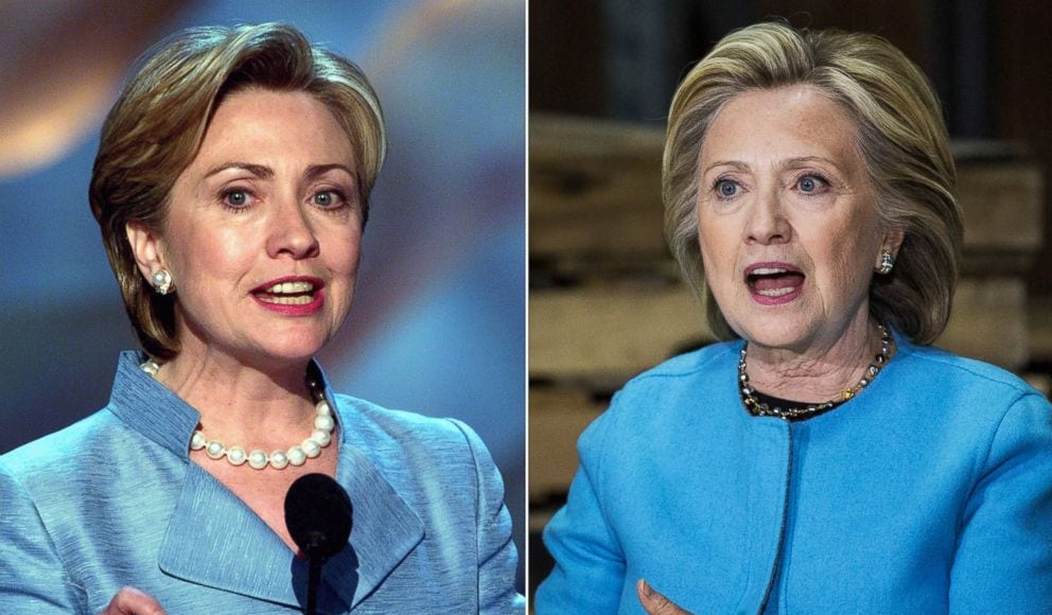Mrs. Clinton has a recurring problem, stumbling more than once over her contradictory positions over the years regarding the rights of small (sometimes very small) persons.
Although she clearly supports abortion, ambiguously including even some late-term abortions, she recently angered pro-abortion activists by stating on Meet The Press that an “unborn person” or “child” does not have constitutional rights.
“When or if does an unborn child have constitutional rights?”, she was asked by NBC’s Chuck Todd. Clinton answered:
Well, under our laws currently, that is not something that exists. The unborn person doesn’t have constitutional rights. Now, that doesn’t mean that we don’t do everything we possibly can in the vast majority of instances to, you know, help a mother who is carrying a child and wants to make sure that child will be healthy, to have appropriate medical support.
The New York Times reported:
[The comments] frustrated some abortion rights supporters who said that her characterization of the unborn as a person shamed women who choose to terminate a pregnancy.
The Times quoted Diana Arellano, community engagement manager for Planned Parenthood of Illinois, who tweeted that “Hillary Clinton further stigmatizes abortion” by calling “a fetus an ‘unborn child.’” The Times also quoted Rebecca Kiessling of the pro-life Personhood Alliance, who said that all persons have a right to life under the 14th Amendment:
It’s interesting that Hillary has now recognized the unborn as person[s] and that she wants to deny them equal protection. You can’t have it both ways.
Long-time Clintonian grammatologists, accustomed as they are to deciphering and deconstructing linguistic evasions such as the various meanings of “is,” can debate whether Mrs. Clinton committed a “gaffe” – an inadvertent blurting of what she really thinks — or “misspoke.” But whether inadvertently or not, when she acknowledged that a pregnant woman is carrying an “unborn person” or a “child” who has no constitutional rights, she contradicted much more than current Democratic Party orthodoxy.
She attacked the now largely forgotten foundation of her own career.
“And what does Hillary believe?” Pat Buchanan thundered at the 1992 Republican Convention. “Well, Hillary believes that 12-year-olds should have a right to sue their parents.”
Indeed she does, or did in the 1970s, as I discussed in a Wall Street Journal op-ed years ago (April 27, 2000). Buchanan was referring to children’s rights articles written by Hillary Rodham early in her legal career, such as the widely quoted “Children Under the Law” in the Winter 1973 Harvard Educational Review, and “Children’s Rights: A Legal Perspective” in a 1979 book, Children’s Rights: Contemporary Perspectives.
Those articles argued that the legal system should be more willing to recognize that in some circumstances children had rights of their own based on interests that differed substantially from their parents’, that some children were competent to express those interests, and that courts should grant them (and at least by implication, others acting on their behalf) standing to do so. On the possibility of conflicting parent-child interests, Ms. Rodham was unequivocal:
The presumption of identity of interests between parents and their children should be rejected whenever the child has interests demonstrably independent of those of his parents.
The young Hillary Rodham’s views produced a kerfuffle of controversy early in the 1992 presidential campaign, and they surfaced again several years later when the administration of her husband moved to deport a child, Elian Gonzalez, against his wishes back to his father in Cuba.
Elian had fled Cuba with his mother, who drowned in the passage to the United States, and preferred to remain with family in the United States. When President Clinton was asked at the time whether Elian might have interests and rights at odds with his father’s, he responded, as I noted in my Wall Street Journal piece at the time:
[A]ny such conclusion would be “a dramatic departure from the law.” Neither he nor his wife has mentioned that for years that is precisely what she called for.
I wrote a couple of years later:
There were those (I was one) who regarded the deportation of Elian as akin to a slave mother drowning as she swam to freedom with her child only to have the child ripped from his relatives in the North and returned to his loyal Uncle Tom father who, when offered freedom with his son, chose to remain on the plantation.
If the conflict of interest between a freedom-seeking son and a communist, Castro-hostage father was not substantial enough to trigger the former children’s rights advocate’s recognition of the rights of that child, I suppose there is no reason to be surprised today. Mrs. Clinton has once again turned her back on her early career-building articles by asserting that “a child” waiting to be born has no right to life or any other constitutional rights.









Join the conversation as a VIP Member